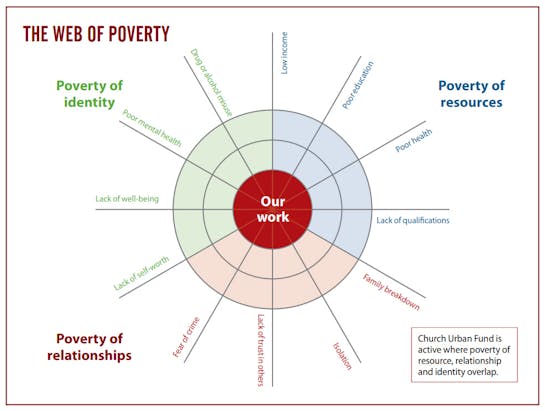
How the Together Network is tackling Financial Exclusion
Money; not always a topic people want to talk about or think about but many of our Members across the country are doing just that in the different initiatives they are running around financial inclusion and fair finance. This work is ensuring that more people are empowered to manage their finances well and avoid the financial distress caused by unmanageable money worries and debt, and the lack of practical knowledge around budgeting, saving and spending.
In Leicester, a Fair Finance Task group has been set up through Together Leicester to address issues of financial inclusion and justice across Leicester and Leicestershire. The group is chaired by the Leicester Diocesan Social Responsibility Enabler and includes representatives from key local agencies in the statutory and voluntary sectors, including the city and county councils. The group primarily wishes to enable those in serious financial difficulty to access support and advice easily and swiftly as despite the work of several agencies in this area, many are not yet receiving adequate help.
The taskforce group’s action plan focuses on the following areas:
- Increasing debt and budgeting support and advice
- Improving signposting to online and local services
- Tackling issues of digital inclusion
Their next steps are:
- searching for further partners (both individuals and businesses) in this work
- building a costed business plan and appointing a project officer to take plans forward
- running an evening on 7th November at 7.30pm with Sir Hector Sants to explore how to build an equitable financial system for all

In the South West, there is a strong focus on helping individuals and communities build financial resilience. As it can be difficult to access or find out about financial support, Transformation Cornwall are working with partners to spotlight the support available at local and national level. They have a created a directory page, listing links and details of many organisations, helpful resources and services, both for those looking to access them and for those interested in developing financial inclusion. One example is a Worrying about Money? Leaflet produced a few years ago by Transformation Cornwall in partnership with the Trussell Trust, Independent Food Aid Network (IFAN) and Cornwall Council. From this work, a review was held of Cornwall Council’s Local Welfare Assistance Scheme to see if eligibility, criteria and accessibility for people unable to afford food could be improved. Suggestions from the review were taken on board and implemented and a steering group on ‘Turning the Tide: Cornwall cost of living’ was set up last year. Unfortunately the cost of living crisis led to a deterioration in the state of financial crisis facing many. An event was held this summer, gathering evidence on the current availability and accessibility to support for those in financial need and promoting funds and support for those facing financial difficulties. A further discussion forum is set for January 2024.

Up in the North-East, Transforming Communities Together Tyne to Tweed run successful partnerships with churches, food banks and local community groups to develop financial inclusion. They have a dedicated Just Finance Development Worker who helps people and organisations across the community access fair and affordable finance and develop in confidence in handling money and achieving realistic financial goals. Some examples of the financial projects taking place across the region, in conjunction with local partners and community organisations include an online portal set up as a ‘one-stop shop’ for residents in Northumberland to learn about managing money well and a Community Money Advice Centre in Seaton Hirst to support the work of a local foodbank, where some church members trained to become qualified Debt Advisors.
Across in the North West, Transforming Lives Together (Chester Diocese) have teamed up with their local Citizens Advice to offer free energy advice workshops across Cheshire East and West council regions. This included giving information on sustainable energy changes to help reduce energy costs and raising awareness of grants available. The Citizen Advice energy advisors now run three different events and workshops for different audiences; a drop-in session for quick but effective energy advice and access to resources, a more in-depth energy advice formal session to be hosted by booked venues and a front-line worker energy presentation.

Down in Sussex, Together in Sussex run sessions and provide resources on money management and budgeting as well as helpful step-by step pointers for people to register for Universal Credit. Their website also offers links to guides from The Money Advice Service and their free debt advice locator tool, links to information on the Just Finance Foundation Money Help Hub — Just Finance Foundation to help communities struggling with the cost of living crisis as well as links to find local credit unions.
Strong partnerships around just finance and tackling financial poverty exist across the Midlands too, and importantly situate this concern not in isolation but in relation to other areas of social injustice too, which can often be interlinked for those in greatest financial need.
In Nottingham, The Christian Action Network (CAN) supports Christian charities and churches to work together to tackle poverty. They contain several subgroups on topics such as Finance and debt, Housing and homelessness and Social enterprise and employability, to name a few. Strengthening Communities in Lichfield released a number of social action videos under the name CHAD (Choices, Habits and Decisions), which include videos on Job clubs, money talks and accessing employment. They, like other partners across the Together Network, use CUF’s Web of Poverty to inform their work, a diagram which highlights that poverty of resources goes hand in hand with poverty of relationships and poverty in identity; something which all our partners across the network are actively and holistically tackling within their communities, with people and community at the heart of the work.

It is never too early to start having responsible conversations about money and budgeting. Research shows that children start to learn essential money habits as early as ages 3 through 7. However, financial education is rarely taught until secondary school. This means that gaps in a child’s ability to understand and relate to money are already in place by their teenage years. Our partner organisation Just Finance Foundation (JFF) trains teachers and supports schools to run their Milo’s Money and LifeSavers financial education programmes in primary schools, as well as supporting parents and families with free financial education resources.
Want more details on the Finance event in Leicester?
Please contact alison.adams@leicestercofe.org
